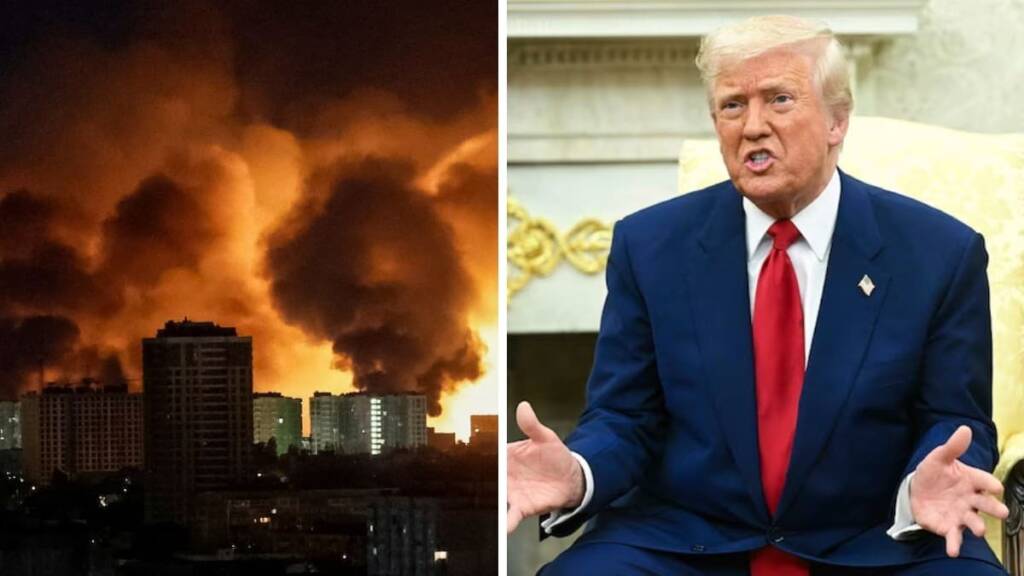Former U.S. President Donald Trump has undergone a striking transformation in his rhetoric toward Russian President Vladimir Putin. Once a vocal admirer, Trump now describes Putin as “absolutely CRAZY,” a sharp departure from his previous stance. This shift reflects a complex interplay of geopolitical developments, domestic political considerations, and evolving perceptions of the Russia-Ukraine war.
Trump on Sunday called his Russian counterpart, Vladimir Putin, “crazy” for launching one of the biggest airstrikes on Ukraine since the start of the war. He also warned Moscow that any attempt at a total takeover of Ukraine would “lead to the downfall of Russia.”
“I’ve always had a very good relationship with Vladimir Putin of Russia, but something has happened to him. He has gone CRAZY! He is needlessly killing a lot of people, and I’m not just talking about soldiers. Missiles and drones are being shot into Cities in Ukraine, for no reason whatsoever,” Trump said in a post on Truth Social.
“I’ve always said that he wants ALL of Ukraine, not just a piece of it, and maybe that’s proving to be right, but if he does, it will lead to the downfall of Russia!” he added.
“I’m not happy with what Putin is doing. He’s killing a lot of people, and I don’t know what the hell happened to Putin,” said Trump on the tarmac at Morristown airport before boarding Air Force One bound for Washington.
“I’ve known him a long time, always gotten along with him, but he’s sending rockets into cities and killing people, and I don’t like it at all.”
The statements came in response to Russia’s massive overnight air assault, where it launched 367 drones and missiles across Ukraine, hitting Kyiv and dozens of other areas. At least 12 people were killed, while Ukraine’s military claimed to have intercepted 45 missiles and destroyed 266 drones. President Volodymyr Zelenskyy said more than 30 cities and villages were affected.
A History of Praise
Throughout his political career, Trump has consistently praised Putin. During the 2016 U.S. presidential campaign, Trump referred to Putin as a “strong leader” and expressed admiration for his leadership style. He often contrasted Putin’s decisiveness with what he perceived as weakness in U.S. leadership. Even after taking office, Trump maintained a cordial relationship with Putin, emphasizing the importance of U.S.-Russia relations.
The dramatic shift in Trump’s tone began amid escalating violence in Ukraine. In May 2025, Russia launched one of the largest aerial assaults of the war, involving nearly 400 missiles and drones, resulting in significant civilian casualties. Trump, who had previously advocated for direct negotiations with Putin, expressed profound frustration. On his social media platform, he declared that Putin had “gone crazy,” condemning the attacks as reckless and counterproductive to peace efforts.
Factors Influencing Trump’s Shift
Several factors may have contributed to Trump’s change in perspective:
Escalating Violence: The recent surge in Russian attacks has intensified global condemnation as well, and traditional US allies are pressing for action against Russia.
Diplomatic Frustration: Despite previous efforts to engage Putin in peace talks, the lack of meaningful progress has led to disillusionment with the Russian leader’s commitment to negotiations.
Domestic Political Considerations: As Trump positions himself for a potential 2028 presidential run, aligning with public sentiment favoring a stronger stance against Russia may enhance his appeal among voters concerned about national security.
Relations with Russia
Trump’s condemnation of Putin marks a significant shift in U.S. foreign policy rhetoric. While he has not yet implemented new sanctions, the possibility remains on the table. The Trump administration’s approach contrasts with previous policies, emphasizing a more direct and critical stance toward Russia’s actions in Ukraine.
In contrast to Trump’s sharp criticism, Putin has remained relatively composed. The Kremlin downplayed Trump’s frustration, with spokesperson Dmitry Peskov stating that Moscow considers efforts to end the war in Ukraine a “drawn-out process” and that discussions are ongoing. Peskov emphasized that Russia remains open to dialogue, though no concrete announcements have been made about a potential truce. Putin himself has not publicly addressed Trump’s remarks directly.
However so far Trump has restricted his criticisms of Russia to rhetoric and has not made big overt moves to counter Russia or change his policy to aid Ukraine. This has frustrated Zelensky who has been running from pillar to post to manage the absence of US aid in the war against Russia. Trump maybe frustrated but he is in no mood to resume the Democrat policies of backing Ukraine.
